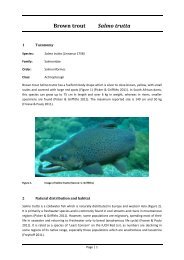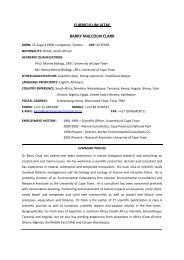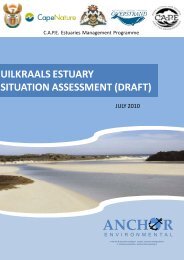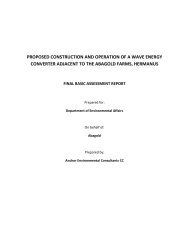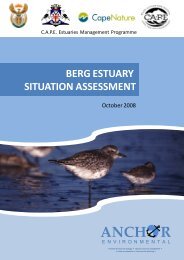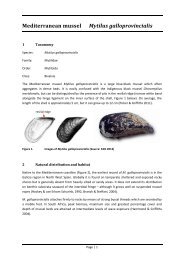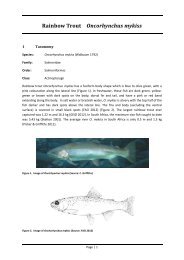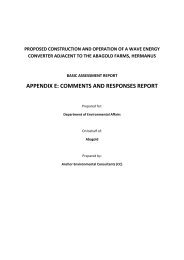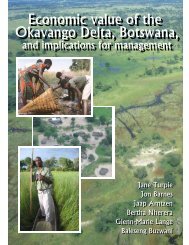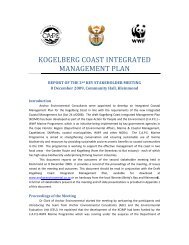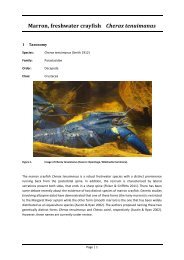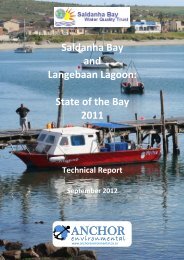Download PDF (2.5MB) - Anchor Environmental
Download PDF (2.5MB) - Anchor Environmental
Download PDF (2.5MB) - Anchor Environmental
Create successful ePaper yourself
Turn your PDF publications into a flip-book with our unique Google optimized e-Paper software.
Monitoring will also be vital for ensuring that the value of the industry is maximised in the longer term,<br />
and should address both demand versus supply, as well as impacts on the resource. Logbook data<br />
needs to be filled analysed and reported regularly. Not all permit holders fill in log books properly, and<br />
MCM has been slow to provide analysis and feedback on log book data. These problems perpetuate<br />
one another, and reduce the benefits that could be derived from good monitoring of the industry, such<br />
as early warnings of resource impacts and indications of capacity for expansion. There is currently no<br />
monitoring of non-permitted operators, which is also crucial to the analysis of the industry and its<br />
ecological and economic impacts.<br />
8.5 Co-management<br />
MCM’s ability to manage the industry could be greatly enhanced under a co-management<br />
arrangement. The operators have the potential to be the ‘eyes and ears’ of the industry, reporting<br />
illegal activity by non-permitted operators, and infringements by other operators. MCM would have to<br />
respond accordingly and would have to follow up on the prosecution of offenders. It is inadvisable to<br />
put enforcement entirely in the hands of the industry, as some desire. While an ecotourism industry<br />
theoretically has an incentive to protect the resource upon which it depends, this may not extend to<br />
self-policing, as the huge separation between operators makes the situation vulnerable to free-riding<br />
and even co-operative non-compliance by neighbouring operators.<br />
Co-management is also essential in the allocation of permits. The system of allocation needs to be<br />
made transparent, and needs to include criteria that indicate the likelihood of success and equity<br />
considerations. Some permits have been issued to operators who have not taken them up or who<br />
have not been able to make a success of it. Several permitted operators have greatly reduced or<br />
ceased their activities. In some cases this has been due to operational problems, while in others,<br />
permit holders have moved on to other activities. This affects the overall output of the industry, both<br />
directly and indirectly through affecting overall impressions of service standards and reliability of the<br />
industry generally. It also prevents others from entering the industry legally. The selection criteria<br />
and process need to be jointly devised by MCM and the industry, and possibly other independent<br />
parties. It is also advisable to include field-based assessments in addition to the paperwork<br />
requirements.<br />
To facilitate co-management, better communication channels need to be devised, preferably through<br />
a single liaison person at MCM and in SABBWWA. This is a concern that was raised by most permit<br />
holders. In turn, SABBWWA also needs to ensure that it respresents the interests of all its members<br />
as far as possible.<br />
8.6 Distributional issues<br />
Maximising the economic potential of the industry will involve more than just maximising turnover<br />
within sustainability limits, as discussed above. While industry turnover is arguably the most<br />
important aspect, in that it directly and indirectly generates income and jobs. This effect is only<br />
maximised, however, when leakages from the industry are minimised. South Africa does relatively<br />
well in this regard, in that most whale watching occurs on locally-owned boats, many of which are<br />
locally-made, rather than, for example, large imported or foreign-owned ‘gin palaces’ and cruise<br />
liners. Direct attraction of tourists by operators or through local travel agencies result in fewer<br />
leakages than arrangements whereby foreign-based tour companies bring clients to operators. In the<br />
latter cases much of the expenditure generated by whale watchers accrues to foreign countries. A<br />
similar principle applies to the related industries that benefit from whale watching tourism.<br />
Another important goal is to maximise the overall welfare gains by ensuring an equitable distribution<br />
of benefits. Boat-based whale watching already attracts business to outlying areas that often have<br />
the poorest communities. While maximising turnover should be a primary goal as the most efficient<br />
way of generating income and jobs directly and through linkage and multiplier effects, efforts need to<br />
be made to ensure that much of these benefits accrue to communities that need development. This<br />
may be through black empowerment initiatives, job creation or some form of community upliftment.<br />
73



